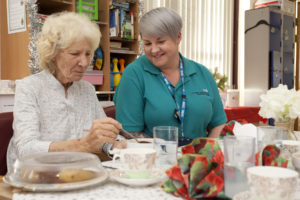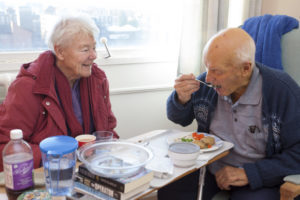 Ensuring patients eat well and have enough to drink is extremely important. Good nutrition and hydration helps patients to recover from illness and injury, usually resulting in a shorter length of time spent in hospital.
Ensuring patients eat well and have enough to drink is extremely important. Good nutrition and hydration helps patients to recover from illness and injury, usually resulting in a shorter length of time spent in hospital.
Despite the best efforts of clinicians, patient meal times can be interrupted due to a number of reasons. Wards and inpatient departments are often very busy places with competing priorities and treatments. To complement recently increased visiting times at the Trust, staff will be moving away from ‘Protected Mealtimes’ and are instead working towards ‘Making Mealtimes Matter’.
This means that non-essential activity will stop during mealtimes and activities will shift from clinical work to the meal service. All staff will be encouraged to help and nutrition-related patient care such as topping up drinks, creating social dining spaces and assisting patients who need help to eat. Carers and families who wish to support their loved ones to ‘Make Mealtimes Matter’ will also be welcomed onto the ward area at this time.
It is hoped that by making these simple changes that mealtimes will become much more structured and enjoyable for patients, while also creating a much more social environment. It’s also important that relatives and carers are welcomed onto wards to help their loved ones if they wish and as such all mealtimes will be displayed upon entry to our wards, clear for all visitors to see.
Moira Hardy, Director of Nursing, Midwifery and Allied Health Professionals, said: “When patients come to hospital, it can be all too easy to forget to treat the person rather than just the symptoms. Mealtimes are incredibly important, and we believe that by ‘Making Mealtimes Matter’, we will improve nutrition, hydration and, ultimately, improve the experience for those staying with us, meaning that many patients will be able to recover sooner.
“At home, we rarely eat lying down, in bed and alone. Meals are social occasions, shared with family members, while dressed and sat at a dining area. This is what we want to achieve at the hospital – to create a structured environment, where patients are encouraged to get up and out of bed, share their preferences and enjoy their breakfast, lunch and evening meal.
This recent innovation is just one of many example of a drive towards what is known as ‘person centred care’ at the Trust. In late 2018, DBTH significantly increased its visiting hours, while further projects encourage patients to get up and dressed when they are hospital to end ‘PJ Paraylsis’, an initiative to prevent deterioration of muscle strength due to bed rest.
In 2017/18, DBTH cared for almost 100,000 patients within wards and services.



